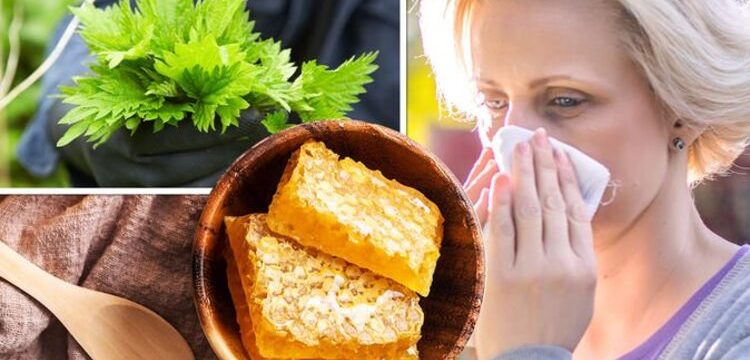Lorraine: Dr Hilary on Carol Vorderman's hayfever
We use your sign-up to provide content in ways you’ve consented to and to improve our understanding of you. This may include adverts from us and 3rd parties based on our understanding. You can unsubscribe at any time. More info
Hayfever affects almost half of all Britons, leaving millions of patients plagued with common cold-like symptoms on a daily basis. With hayfever season now in full swing, itchy eyes and relentless sneezing has left many of us reaching for the antihistamines – but what are the best natural remedies for these unpleasant symptoms? Express.co.uk spoke to the experts to find out exactly what to use to get your hay fever under control.
At least 57 percent of all hayfever patients in the UK report common symptoms, yet many people are still unaware of the options available for dealing with these unpleasant side effects.
Speaking exclusively to Express.co.uk, Dr Jess Braid, qualified medical doctor, acupuncturist, and Chinese and Western herbalist said: “Most of us long for spring and summer, but for some of my patients, this can be a miserable time of year.
They develop symptoms such as itchy eyes, a runny or blocked nose, a sore throat, skin problems and in some cases, asthma.”
While antihistamines are the simplest way to relieve these uncomfortable symptoms, the side effects of some medications can be just as bad.
The NHS recognises drowsiness, blurred vision and a dry mouth as common reactions to loratadine and other types of antihistamine, but what are the best natural alternatives?


Chamomile
It may seem counteractive to consume plants which contain pollen, but according to Saf Hareshe, Herbal Education Specialist at Pukka Herb, it really does work.
Speaking exclusively to Express.co.uk, Saf said: “It’s thought that the chamomile plant may have anti-inflammatory, antioxidant and antihistamine properties, all of which may help to relieve the allergic symptoms caused by a reaction to pollen.
“While it’s unlikely to be a magic cure, sufferers may find that drinking a cup of freshly brewed chamomile tea may help to ease inflamed sinuses and itchy eyes.”
Other ways to use chamomile to easy symptoms include:
- Chamomile inhalation – breathing in steam from a freshly brewed chamomile tea will help to calm and moisten inflamed mucous membranes in your sinuses and airways.
- Herbal compress – soak a cloth in chamomile tea and leave it to chill before applying to your eyes as a soothing compress.
Eyebright
Eyebright is another beautiful flower which is known to alleviate inflammation of the eye, help with itchiness and puffiness and reduce irritation and catarrh in the nose.

Chinese herbs
There are many excellent traditional Western and Chinese herbs for hayfever that a good herbalist can prescribe based on your symptoms.
Boswellia
Dr Jess Braid, qualified medical doctor, acupuncturist, and Chinese and Western herbalist said: “Ayurvedic herbalists consider Boswellia a herbal anti-inflammatory and often use it for arthritis.
“However, Boswellia has also been shown to reduce inflammatory chemicals such as histamine and leukotriene (involved in hayfever), and in a clinical trial of asthma patients 70 percent of patients improved. It’s considered to be a very safe herb and can be taken as a tablet.”
Baikal skullcap
Baikal skullcap is a traditional Chinese herb used to treat hayfever and other allergies, such as asthma, eczema and urticaria.
It is also effective for fevers, infections and inflammation, and has been the subject of Chinese researchers looking into herbal remedies for COVID-19.
DON’T MISS:
Do you have hayfever or a spring cold? Expert explains [ANALYSIS]
When does hay fever season start? The 9 symptoms to look out for [REVEAL]
Thunder fever warning: Common symptoms to look out for [INSIGHT]

Local honey
In its rawest form, honey is composed of bee pollen, which is why it is a key ingredient in the treatment of hayfever symptoms.
Giulia Guerrini, the lead pharmacist at digital pharmacy, Medino said: “Honey is a great natural hayfever remedy, and probably one of the sweetest ones you’ll find. “However, honey that you find at the supermarket won’t do the job; you’ll need to find some local honey from a local supplier, such as your local farmer’s market.”
Consuming local honey is effective because it helps you to build up a natural tolerance to the pollen in your area.
Nettle
Nettle is an excellent all-around antihistamine remedy and comes out in early spring just in time to treat hay fever.
Similarly to local honey, other local herbs can have a similar effect on the body’s pollen tolerance, so have a search in a park or a nearby forest for other anti-allergic herbs.
Saf recommended looking out for plants like plantain, echinacea, yarrow and elderflower.
Probiotics
Dr Braid explained: “Supporting the gut microbiome (gut bacteria and microorganisms) is one of the best ways to improve the health of our immune system, as over 70 percent of the immune system is in our gut.”
A double-blind trial of 173 hayfever patients showed that taking daily probiotics improved symptoms and quality of life during hayfever season, so try to increase your intake of fermented foods and probiotics like kefir.
Vitamins and minerals
Studies show that as zinc levels decrease, allergic reaction markers in the blood increase. Zinc is critical for the immune system and is likely to be beneficial for hayfever, but it’s not the only vitamin you should be getting a little more of.
Vitamin D also plays a large role in immune function and levels are shown to be low in many allergic diseases, including allergic rhinitis.
Dr Braid added: “Quercetin has known anti-inflammatory and anti-allergy properties and can inhibit histamine and inflammatory chemicals that create the symptoms of hayfever.”
Quercetin can be found in:
- Citrus
- Apples
- Onions Parsley
- Sage
- Broccoli
- Berries
Source: Read Full Article
